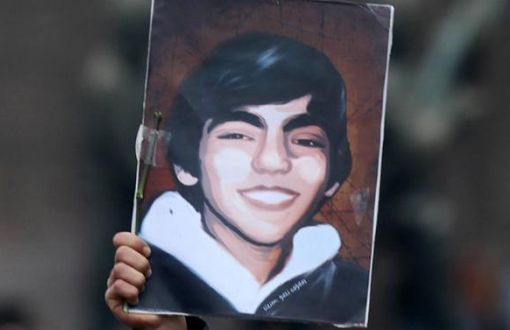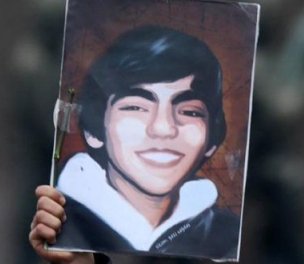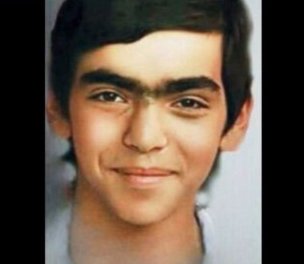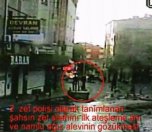Click to read the article in Turkish
The European Court of Human Rights (ECtHR) has started examining the application regarding the death of Berkin Elvan, who lost his life after being shot on his head with a tear gas canister fired by a police officer in Okmeydanı, İstanbul during Gezi Resistance in 2013.
As reported by Kayhan Karaca from Deutsche Welle Turkish, the ECtHR has started processing the application as a "priority case" and addressed a series of questions to the government of Turkey.
Both applications made by the Elvan family to Turkey's Constitutional Court through their attorneys were previously rejected.
Having evaluated the application of Elvan family as to the violation of right to life and a failure to give a permission for investigating the public officials, the Constitutional Court rejected this application due to "lack of grounds." This ruling was notified to the attorneys on May 31, 2019.
Speaking to bianet about this ruling, Çiğdem Akbulut, one of the attorneys representing Elvan family, previously said:
"In rejecting our application regarding the violation of right to life, it is openly said that 'If the police used unproportionate force, the ones who gave the orders were not accountable for this.'
"It is an evaluation that disregards the administrative structure of the state and its superior-subordinate relationship. The police officer who fired the canister is put on trial for abiding by an unlawful order, but the ones who gave the order are exempted from responsibility."
The application as to the investigation against other police officers accountable for Elvan's killing was rejected by the court in February 2020. The trial of one police officer as to the death of Berkin Elvan still continues.
Application about violation of 5 different articles
After the Constitutional Court rejected these two applications by Elvan family, the case was taken to the ECtHR on November 29, 2019.
In the application to the ECtHR, it was indicated that the death of Berkin Elvan was caused by an excessive use of force and claimed that police officers were not given sufficient training about the use of gas canisters and this issue was not clear in the related legal regulation.
The application also referred to the long period of time that the criminal proceedings against the police officer took and complained that no effective investigation had been conducted into the incident.
The complainants also underlined the sorrow caused by the fact that Berkin Elvan was comatose for 269 days and argued that the Article 2 of the European Convention on Human Rights (ECHR) on right to life, the Article 3 on the prohibition of torture and ill treatment, the Article 10 on freedom of expression, the Article 11 on freedom of assembly and Article 13 on the right to an effective remedy were violated by his death.
Why were public officials not investigated?
The ECtHR requested the government of Turkey to explain the claim that the right to life was not violated based on the criteria of the ECHR. The supreme court also requested that Turkey explain how the death of Berkin Elvan was caused by "the use of absolutely necessary force."
Asking Turkey what precautions it took to eliminate any possible risks to be posed by the use of gas canisters to right to life, the ECtHR has also requested information as to the legislation pertaining to the use of such weapons in demonstrations. The training given to police officers regarding the use of gas canisters is also asked by the ECtHR.
Requesting information about the investigation into the death of Berkin Elvan as a whole, the ECtHR has demanded that Turkey present evidence proving that the investigation was conducted in accordance with the article of the ECHR on right to life. The court has also requested details as to the rejection of requests for prosecuting state officials during the investigation.
With respect to the effectivity of the investigation, the ECtHR has also questioned the fact that the criminal liability is on a single police officer.
The same questions have been sent to the complainants as well. According to the related procedures of the ECtHR, the Berkin Elvan family and the government now have 12-week time to find a possible friendly solution. If the parties cannot find a solution themselves, the ECtHR will give them another 12 weeks to answer the above questions.
Depending on the answers to be provided by the parties, the ECtHR will hear the case as to the merits. In this process, the court might also decide to hold a hearing about the case in Strasbourg, France.
In a judgement dated 2013, the ECtHR concluded that the legislation of Turkey pertaining to the use of pepper gas by police in social incidents was not compatible with the ECHR and expressed opinion that it needed to be amended. In this ruling, the court also noted that the police should use the gas canisters by firing them in a "tilted position" (45-40 degrees).
What happened?On June 16, 2013, Berkin Elvan was hospitalized due to grave head injuries after the police intervention in the district of Okmeydanı in İstanbul. When he was admitted to the Okmeydanı Research Hospital, his heart had reportedly stopped already. Suffering from a brain hemorrhage, Elvan went through at least five surgeries. On January 5, 2014, Elvan turned 15 in his comatose. He died on March 11, 269 days after being shot. While the prosecutor investigating the incident was changed for six times, the investigation was completed on December 7, 2016. Prepared by the İstanbul Chief Public Prosecutor's Office, the indictment demanded that police officer F.D., who was referred to as the only defendant, be penalized on charge of "killing with eventual intent." The 11-page indictment sent to the İstanbul 17th Heavy Penal Court has been accepted. A verdict of non-prosecution has been given for 42 police officers, who previously made their depositions as part of the investigation into the death of Elvan. Speaking to bianet, Oya Aslan, one of the attorneys for the Elvan family, stated that a lawsuit was filed only against a single police officer who was on the scene of incident and added that since the lawsuit was filed for "killing with eventual intent", rather than for "wilful murder", it has reduced the foreseen prison sentence to 20 years. The case is still continuing. Its next hearing will be held on May 8, 2019. |
(AS/SD)





-132.jpg)



